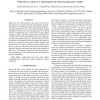Free Online Productivity Tools
i2Speak
i2Symbol
i2OCR
iTex2Img
iWeb2Print
iWeb2Shot
i2Type
iPdf2Split
iPdf2Merge
i2Bopomofo
i2Arabic
i2Style
i2Image
i2PDF
iLatex2Rtf
Sci2ools
101
click to vote
MMSP
2015
IEEE
2015
IEEE
Perceptual quality assessment of high frame rate video
High frame rate video has been a hot topic in the past few years driven by a strong need in the entertainment and gaming industry. Nevertheless, progress on perceptual quality assessment of high frame rate video remains limited, making it difficult to evaluate the exact perceptual gain by switching from low to high frame rates. In this work, we first conduct a subjective quality assessment experiment on a database that contains videos compressed at different frame rates, quantization levels and spatial resolutions. We then carry out a series of analysis on the subjective data to investigate the impact of frame rate on perceived video quality and its interplay with quantization level, spatial resolution, spatial complexity, and motion complexity. We observe that perceived video quality generally increases with frame rate, but the gain saturates at high rates. Such gain also depends on the interactions between quantization level, spatial resolution, and spatial and motion complexities...
MMSP 2015 | Multimedia |
Related Content
| Added | 14 Apr 2016 |
| Updated | 14 Apr 2016 |
| Type | Journal |
| Year | 2015 |
| Where | MMSP |
| Authors | Rasoul Mohammadi Nasiri, Jiheng Wang, Abdul Rehman, Shiqi Wang, Zhou Wang |
Comments (0)

